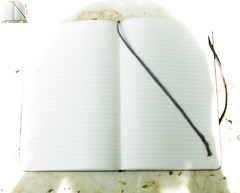
One thing a diary records with uncommon eloquence is its own end. After a friend's death a few years ago, I picked up her datebook and leafed through it. It was full of the appointments and memos to self and hastily scrawled phone numbers that daily life spawns. Full of the wildly slanted handwriting that was quite simply her. When I came upon the sudden and irrevocable whiteness of the pages she would never fill, her loss became tangible for the first time.
War is all about the white pages, the abrupt endings, the silence that echoes through decades. In this morning's New York Times there was a piece about the diary of Dang Thuy Tram, a young doctor who died on the battlefield in 1970. It was salvaged by an American veteran named Fred Whitehurst who saw Tram as "a sister and a teacher."
For thirty-five years, Whitehurst carefully preserved it. "Human to human," he said, "I fell in love with her."
Last year he located Tram's mother and returned the document to her.
"When I have the diary in my hand," the mother said, "I feel I am holding the soul of my daughter."
That statement made me think of the words we leave behind, both written and verbal. Are we, as we draft them--sometimes after much thought, but most often carelessly, creating that thing we call the soul?
Somehow it brought me back to a recent post by pohanginapete, who casts great light on any subject he considers. In this piece, he reflected on the now uncommon term "fountain pen".
I wondered: will the people who hold the words that flow from our "pens" in the future experience our fire and humanity as Whitehurst did when a translator first read Tram's diary to him? Will they feel that in some essential way, we are there "in front of them" as her mother did on opening the notebook?
If so, the pen is a powerful fountain indeed.
13 comments:
Yes it is!
Nice story for pondering. The written word and even in type the cadence of phrase evokes a person with such immediacy.
Thanks for the compliment, Patry; and I thought this post of yours to be beautifully written and highly thoughtful. Those characteristics — being both evocative and instructive; luminous and reflective — captivate me.
You have such a fascinating mind, Patry. Thank you for sharing this.
"One thing a diary records with uncommon eloquence is its own end."
Yes. It can be insanely painful.
My mother kept a diary from the time she was a little girl. It's how we found out just how many decades she'd been having suicidal ideations, and how it may have started.
I am unable to keep relics, because they tend to hurt me too much. But my sister, who had been estranged from our mother for quite some time by the time she left us, took the diaries, the boxes and boxes of them, and systematically read them all immediately after our mother's death. She still keeps them. When I asked her why, she replied, "I need them."
I cannot imagine what reaching that last page must have felt like to her, and I don't know how many times she has gone there.
The only things I've kept are photographs I took of her and her paintings. They do not speak with words. They do not end.
i love this post, patry...the questions it opens for us to examine. so much of your writing does this, and i thank you for the exciting exercise i get when i come here.
R: Thanks!
pearl: So true. So often, I've felt I know a fellow blogger who I've never met on a deep level. The phrase "held their soul in my hand" is not far from true.
silvermoon: thanks for visiting and welcome! I loved those lines from TRam's mother, too--and the Veteran's determination to return the diary is very moving.
Thanks for the kind comment on my novel!
pohanginapete: Thank you. Means a lot.
Myf: Such an incredibly kind thing to say...Thank you, dear.
sara: Thank you for sharing this powerful--and very moving--story from your life here. Your comments are always wonderful.
sky: Thank you. I love to ponder the questions, though I'm not so good with answers. Fortunately, my commenters often come up with some great ones.
When I was suffering from manic depression, my only company is my diary. After some time, my canvas, my poetry and my blogs.
The story here is like my own, my mother would never know what I went through in my life. She didn't even see my art exhibits or my paintings for that matter, or read my poetry and other writings. What she knew about me was a sweet, awkward lad who left our remote town long time ago to find his life in the city. And I prefer the way she knows me.
Thanks for this wonderful post Patry.
Wow. The empty white pages. I do think a handwritten journal holds a part of our soul
My brother Jim had a list of things to do on his bedside table before he died. Right up until the last minute everything seems important. He had his teeth cleaned 2 days before he died.
Colleen: nothing speaks so eloquently as a small, concrete detail. The mention of the list beside your brother's bedside is so vivid. Thanks for sharing it here.
Sorry to be so late getting here, Patry - I'm just catching up on blog reading. And this post of yours really touched me, especially that mother's words. I will be going back soon to go through my mother's closet and desk. It won't be easy. She didn't write diaries, but she wrote to me nearly every day, so I have those notes. And in her desk I'll find every letter I ever wrote to her.
Post a Comment